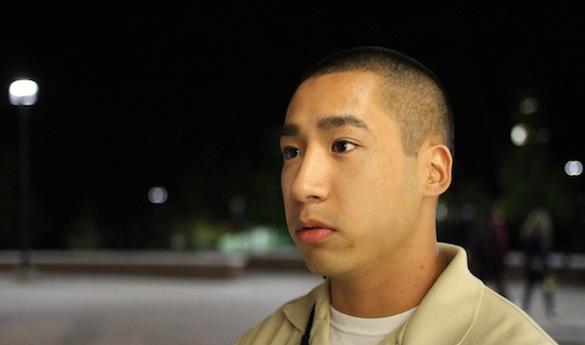Cadets act as eyes and ears of police department
Mason Police are a fixture on campus, frequently seen roving the streets in white sedans marked with green and gold and standing guard by campus buildings.
The police cadets, who are students, are distinguished from them only by the miniature radios on their shoulders and the block letters on the backs of their beige shirts.
Although located in Nottoway Annex, far away from the police department headquarters at the Rappahanock Parking Deck, the Police Cadet Program has evolved intoa major component of the University Police Department since its inception in 2003.
Since they are not sworn employees of the police department, cadets do not have powers of arrest.
Rather than getting directly involved in rule enforcement, they simply provide additional support to the university police.
“They are the eyes and ears of the police department,” said Officer-In-Charge Philip Surber, an officer with the University Police Department assigned to oversee the program.
The cadets have a variety of responsibilities. Most notably, they patrol the campus on foot and in university vehicles, keeping their eyes open for any suspicious or deviant activity, as well as helping direct the flow of traffic on Mason’s busy roads.
Other duties include monitoring the dining facilities, locking and unlocking the doors of university buildings, supervising events and providing nighttime escorts for students who might feel uncomfortable walking to their dorms or cars on their own.
The program hires new cadets every semester. Ben Charnrissuragul, a senior majoring in criminology, law and society, joined after seeing a flyer posted on campus.
“The reason I joined was because I was too old to join the Fairfax County Police cadet program, and for this cadet program, there was no age restriction for it,” Charnrissuragul said. “As long as you are a student, you are able to become a cadet, so I hopped on the opportunity once I saw it.”
Joining the program is an involved and somewhat complicated process. After completing the online application, candidates have to go through two interviews: one via telephone and another in person.
They have to pass a polygraph test and a background investigation as well. Cadets are required to have clean criminal and driving records and must have not used illegal drugs at any point in the past year.
Even after getting accepted, they must undergo a rigorous 102-hour training program before becoming official cadets. Nonetheless, students are drawn to the cadet program for a variety of reasons. Members get paid $10 an hour, and the program is a good résumé builder for those interested in law enforcement.
“A lot of students in the program are criminology majors, so this gives them an opportunity to work in a real police station,” Surber said.
Charnrissuragul has little to complain about his role. He enjoys interacting with his fellow cadets and others in the Mason community.
However, he does acknowledge one downside.
“There are parts of the job where you do see the bad in people,” Charnrissuragul said. “I guess, especially during traffic with pedestrians just not crossing, crossing without being told to. Sometimes [people in cars] do give us the finger, shout at us, scream at us, because we’re not letting them go through, but at the end of the day, there’s only so much we can do with the amount of traffic that comes in.”
Surber, who only joined the program recently, also remarked that the cadets often report getting negative vibes from other students.
“I guess people see the patches and associate them with the police department,” Surber said. “They don’t really trust the cadets; [they] think they’re out to get them into trouble.”
The cadets are engaged in ongoing efforts to build a more trusting relationship with the rest of Mason by helping to maintain a secure campus environment and working closely with the local community.
This story appeared in the Sept. 16 edition of Fourth Estate Weekly.

